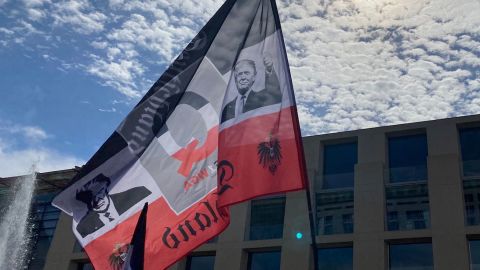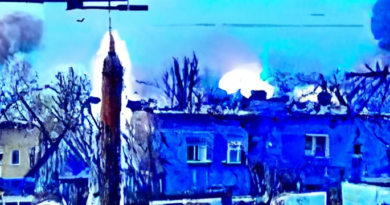How the ‘parasite’ QAnon conspiracy cult went global
In a small town in northern Germany, the local yacht club isn’t what it used to be. Many of the members – mostly middle-aged men – have been sucked into the conspiracy theories of the QAnon movement: that the coronavirus is a hoax perpetrated by secret elites and that President Donald Trump will save the world from the machinations of the “deep state.”
They’ve also embraced other themes that circulate among QAnon followers in Germany: displaying the flag of the pre-war German Reich, which is popular among neo-Nazis, and the false belief that German Chancellor Angela Merkel used to be a spy for the East German security service and will soon be arrested.
These conspiracy theories and many more, which have spread across social media rapidly this year, led Facebook to take drastic action to curb the impact of QAnon on its platforms. On Tuesday the social media giant announced it would “remove any Facebook Pages, Groups and Instagram accounts representing QAnon, even if they contain no violent content.”
Facebook said it is “removing content accordingly, but this work will take time and need to continue in the coming days and weeks.”
As part of a wide-ranging investigation into the dramatic growth of QAnon accounts outside the United States, CNN recently sent Facebook details of dozens of groups and pages that embraced QAnon conspiracy theories. Facebook said it would investigate them and had begun removing some pages.
Among the pages that may be removed in the coming weeks are several of the German yacht club’s members, which CNN is not publicizing, and which had devolved into a cocktail of QAnon falsehoods.
The son of one member, who asked not to be named to protect his family from further media attention, said his father had begun by believing the coronavirus pandemic was a plot and might “spiral down into even weirder conspiracy theories.”
He told CNN that, at one point, yacht club members raised the flag of the neo-Nazi Reichsburger movement. Reichsburger followers deny the Holocaust happened and have picked up on a number of QAnon themes. They joined a Berlin protest against lockdowns in August, which was also attended by some of the yacht club’s members.
QAnon goes global
QAnon began life as a uniquely American phenomenon. In October 2017, an anonymous user describing themselves as Q (which is a level of US security clearance) posted on the message board 4chan. These messages, often cryptic riddles, would become known as “Q drops.” They featured conspiracy theories about the Mueller investigation into Russian interference in the 2016 US election and much else.
Their popularity has grown ever since.
CNN has explored hundreds of social media accounts in tracking the explosive growth of QAnon internationally, a virtual cult that has created a dilemma for platforms such as Facebook and Twitter. Among those examined were nearly 180 Facebook groups and pages that espoused QAnon themes, all of them from outside the US and the majority in Europe or Latin America. Within Europe, Germany, Italy, France and the United Kingdom had the highest engagement with QAnon.
Combined, the QAnon-related Facebook pages and groups reviewed by CNN logged a total of at least 12.8 million interactions between the beginning of the year and the last week of September.
Almost all that activity happened since March, when the coronavirus pandemic spread quickly across Europe.
Facebook began tackling QAnon in August, when it embarked on a process of removing accounts that discussed potential violence.
It said Tuesday: “We removed over 1,500 Pages and Groups for QAnon containing discussions of potential violence and over 6,500 Pages and Groups tied to more than 300 Militarized Social Movements. But we believe these efforts need to be strengthened when addressing QAnon.”
Among the falsehoods published and discussed in these groups and on these pages are claims that secret cabals are involved in widespread trafficking and torture of children, that 5G mobile phone masts cause cancer and that political elites are using the pandemic to monitor and control people.
For example, in Britain a Facebook group dedicated to stopping the rollout of 5G had almost 60,000 members before the social network deleted the account in April.
These disparate themes swirl together with anti-Semitic tropes and fascist insignia. Besides the Reichsflag, the flag of the 1930s British Union of Fascists appeared at one London event that attracted QAnon followers. Many QAnon followers and far-right groups are united in the belief that an end-of-times confrontation between forces of evil and good is at hand.
The pandemic boost
CNN’s tracking of QAnon engagement through CrowdTangle – a Facebook tool that shows likes and shares for content across social media – showed a remarkable increase as the coronavirus pandemic took hold across both Europe and Latin America.
This echoes research by the Institute for Strategic Dialogue. It found that from October 2017 to June 2020, 69,475,451 million tweets, 487,310 Facebook posts and 281,554 Instagram posts mentioned QAnon-related hashtags and phrases. And it said: “a clear trend exists showing a notable increase in conversation volumes coinciding with periods when lockdowns were issued in response to the Covid-19 pandemic in March 2020.”
In July, internet trust tool NewsGuard identified “448,760 followers or members” of European QAnon groups in social media it analyzed. That’s an indication of the scale of Facebook’s task in removing QAnon content.
Matthias Poehlmann, a cult specialist with a German evangelical church, said people “search for conspiracy theories that are supposed to offer clarity about the secret plan of the ‘deep state’ because the coronavirus pandemic has caused a feeling in many of a loss of control.”
“Many also believe that they are being left behind, that they don’t have a say in political decisions. And as is usually the case with conspiracy theories, they also react to a longing for simple answers,” Poehlmann said.
A survey by polling group Kieskompas of 8,000 adults in the Netherlands in August found that 10% believed one or more coronavirus-related conspiracy theories and nearly 6% thought a Covid-19 vaccine would include an implant so their movements can be tracked.
In Germany dozens of small Telegram groups of self-described “Corona rebels” have sprung up. The number of followers of Qlobal Change – one of the main QAnon Telegram channels in Germany – rose from 20,000 before the coronavirus crisis to more than 120,000 in September, according to research by Josef Holnburger, a data scientist at the University of Hamburg.
It is a splintered, chaotic landscape. QAnon has no structure, no leadership. It is bound together by a few hashtags – such as #SaveTheChildren and #Wherewegoonewegoall, also known as #WWG1WGA
“Everyone can contribute to this story with his or her own conspiracy theory … it is almost like a building kit where you can link one conspiracy theory to the next,” Poehlmann said.
The rabbit hole
Viktor – who didn’t want to use his real name because he’s concerned about harassment – was an early convert to the conspiracy theories that gave birth to QAnon. A Russian in his mid-twenties living in Germany, he stumbled across what became known as PizzaGate, which baselessly claimed that a Washington, DC pizzeria was a hub for child trafficking masterminded by Hillary Clinton.
“I don’t know how I got hooked,” he told CNN from Munich, where he is a software developer. The PizzaGate conspiracy led him down one rabbit hole after another, feeding an antipathy towards feminist, liberal and LGBTQ activists, he said.
Viktor says that as he became more embroiled with QAnon so he became angrier – “ready to explode … it poisons day-to-day life to the point you can no longer maintain healthy relationships.”
“Conspiracy replaces your personality. It’s like a parasite on top of you, you talk about conspiracy, not building personal connections,” he told CNN.
An American woman living in Ireland who asked not to be named for fear of further disrupting her family, contacted CNN about her 38-year-old son, who lives in the UK and became absorbed in QAnon theories. She had turned to a Reddit message board called QAnon Casualties for support.
“My son is a brilliant man who has become an idiot,” she told CNN, adding that he cut her off from her grandchildren. When she contracted Covid-19, he dismissed it as a cold.
She thinks the “lockdown and work from home” fed into his behavior. “It does feel like they’ve been abducted somehow. It’s a cult.”
Anti-Semitic traffic
Never far away from QAnon pages are anti-Semitic conspiracies and tropes. Billionaire philanthropist George Soros and the Rothschild dynasty are frequent targets. QAnon followers sometimes refer to the Protocols of the Elders of Zion, a fake document from the early 20th century purporting to be a record of secret meetings in which Jews plotted to control the world.

In the UK, the Community Security Trust, a charity that tackles anti-Semitism, says conspiracy theories featured in 218 anti-Semitic incidents recorded between January and July of this year. One-hundred and seventy spoke of Jewish power and influence in global politics, a common theme among QAnon followers.
Dave Rich, director of policy at the Trust, told CNN: “The anti-Semitism isn’t necessarily explicit in a lot of these sort of Q discourses, and it isn’t necessarily what drives it, but all the tropes are there if you want to see them.”
Ruben Gerczikow, vice president of the European Union of Jewish Students, said he has noticed that online “sometimes people are referring that I am part of this global conspiracy.”
“I am the perfect enemy basically,” he told CNN. Gerczikow said his organization had warned the Jewish community in Germany to stay away from protests against lockdown restrictions.
Taking to the streets
As lockdowns have eased, these tropes and many other QAnon theories have appeared on the streets – especially in Germany, Italy and the UK – in a different and more disturbing guise.
Nearly 40,000 people attended a Berlin rally at the end of August to protest against lockdown and mask mandates but also the “deep state.” The event was notable for the number of far-right groups that joined in (like the Reichsburger) and for its adulation of President Trump.
In a video message, Austrian far-right activist Martin Sellner told the protesters they could mobilize a “broad, patriotic mass” to fight the “grand strategy” of global elites. Members of the Reichsburger tried to force their way into the German parliament, a symbolic act meant to recall the Nazis’ burning of the Reichstag.
Poehlmann says the Berlin protest was “the call for the strong man who is fighting and working against the establishment. Trump is idolized as the savior, more or less, who is leading the battle against the deep state.”

The rally made waves online. One German QAnon-related page, “Freiheit ist das Recht, anderen zu sagen, was sie nicht hören wollen” (“Freedom is the right to tell others what they don’t want to hear”), amassed 1.3 million views of Facebook Lives around the protest. And a banner asking Trump to “make Germany great again” was liked more than 16,400 times on Instagram.
Last weekend, another rally took place in Konstanz, southern Germany, attended by several thousand people.
One of the speakers at the event, Traugott Ickeroth, told CNN: “I read the Q drops regularly, this Q is very intelligent and it seems that he knows the future, he’s very exact.”
Another QAnon sympathizer at the rally, who did not want to give his name, said he was “not the typical” Q follower. “There are some good things they’re posting, many things that came out as true, but I wouldn’t say I’m a blind Q follower,” he told CNN. “Many things have been right that they’ve said … several things they’ve predicted came true.”
Some observers believe fringe far-right groups are grafting themselves onto QAnon groups to give themselves a greater profile.
The Jewish Students Union in Germany says the anti-lockdown protests have become an “oasis of well-being” for neo-Nazis, anti-Semites and other far-right groups. According to Josef Holnburger at the University of Hamburg, Reichsburger’s following grew from 10,000 to about 100,000 subscribers across online platforms in the first four months of 2020 alone.
In Italy, the far-right Forza Nuova has latched onto QAnon’s momentum, working with the cult’s followers to organize a protest in Rome in August. Some figures in the right-wing party Lega, like Patrizia Rametta in Sicily, have embraced QAnon ideas and revived the Protocols of Zion conspiracy.
But it’s not solely the right that has propagated themes popular among QAnon followers. Sara Cunial, an independent member of the Italian parliament who used to represent the populist Five Star Movement, claimed in the Italian parliament in May that philanthropist Bill Gates was behind a vaccination drive aimed at “absolute domination over human beings reduced to guinea pigs and slaves.”
Videos supporting her gained almost 1,730,000 views on YouTube in only two days, and three of them received nearly 600,000 interactions on Facebook, according to the Atlantic Council’s Digital Forensic Research Lab. The hashtag #IoStoConSaraCunial (“I Stand With Sara Cunial”) gained 5 million impressions on Twitter within 48 hours.
Facebook later noted on the video of Cunial speaking that “independent fact-checkers say that this information has no basis in fact.”
Real consequences
Some might dismiss the QAnon phenomenon as the online paranoia of a tiny minority, but it’s had and still has real-world consequences. In December 2016, a 28-year old man from North Carolina fired three shots at the DC pizza restaurant supposedly at the heart of the PizzaGate conspiracy.
QAnon has since lured in thousands of people genuinely concerned about the real rise in abuse and pedophilia reported by child protection agencies, an increase they associate with the impact of the pandemic.
In the UK the National Society for the Prevention of Cruelty to Children told CNN that the issue of sexual abuse of children is an “incredibly emotive issue” and whipping it up can lead to vigilante action.
“We can’t protect children by fueling a moral panic,” said NSPCC’s Andy Burrows.
Burrows told CNN that social media platforms “have been exploited and built services without an understanding of how they could lead to mischief increasing.”
A film called “UK’s Hidden Shadows” claiming child abuse by secret elites in Britain has surpassed 500,000 YouTube views.
Several groups that combat child abuse say it has disrupted their work. KidSafe, an international charity devoted to keeping children safe, said QAnon “associate their message of hate and bigotry with well-known, well-regarded organizations.”
“That strategy threatens to diminish our identities, tarnish our reputations and harm our good works,” KidSafe said.
Few QAnon accounts or groups explicitly call for violence, though plenty abuse and harass journalists who report on the phenomenon.
However, some who become obsessed with conspiracy theories are prone to violence. In a 2019 internal memo, the FBI said that involvement with QAnon could “occasionally induce both groups and individual extremists” to “carry out criminal or violent acts.”
In February this year Tobias Rathjen shot dead nine people at two shisha bars in immigrant areas of the German city of Hanau before killing himself. The 43-year-old extremist left behind a rambling screed that combined racism with a lot of the themes circulated by QAnon, but he didn’t specifically mention QAnon.
One reason that QAnon is so hard to track is its diffusion across so many online platforms.
Graphika, which analyzes social media networks and how they evolve, told CNN that it had migrated to mainstream platforms quickly after starting out at the fringe on Gab, 4chan and 8chan, unfiltered websites that are popular with extremist groups. QAnon followings now populate all the main platforms: Twitter, Facebook, YouTube, TikTok and Reddit.
The major social media platforms have begun taking action against QAnon. Twitter said it had removed some 7,000 QAnon-associated accounts in July.
On September 30, Facebook announced it was “prohibiting anyone on our platform from running ads that praise, support or represent militarized social movements and QAnon.”
Even so, the tech companies are struggling to keep up with the proliferation of conspiracy theories and incitement pushed by QAnon followers in multiple languages around the world.
It’s obviously a tough call to delete or restrict accounts that appear to campaign against child trafficking. But Facebook has decided that because QAnon followers use hashtags like #savethechildren, it would “direct people to credible child safety resources when they search for certain child safety hashtags.”
Thousands of QAnon followers have migrated to the less-regulated space of Telegram.

Oliver Janich – a self-described German libertarian who lives in the Philippines – has been promoting QAnon for nearly three years. In one video he asked: “Who is Q? Trump’s secret agent?” He began this year with 40,000 subscribers on Telegram. By late September, he had 140,000.
A former television journalist, Eva Herman, who has become an icon of QAnon in Germany, had 141,000 members on her Telegram channel at the end of September. She has promoted several themes popular among QAnon followers. A YouTube discussion in May between Herman and the German singer Xavier Naidoo, who also embraced QAnon theories, garnered nearly 1 million views.
QAnon followers often create back-up accounts to avoid being shut down. “Instead of having one big group that the platforms might be able to delete, they spread out and formed local groups,” Holnburger said.
Miro Dittrich, who tracks far-right extremism at the Berlin-based Amadeu-Antonio-Foundation, likens QAnon to a mushroom. “The roots of a mushroom grow and grow. And whenever there’s a crisis, the blooming of mushrooms gets activated.”
Compounding the problem is the lack of obvious avenues for QAnon followers to “detox” or for people to seek advice on coping with family members seduced by QAnon. Christoph Grotepass at Sekten-Info NRW, a counseling service in Germany, told CNN that “roughly a quarter to a third of the inquiries regarding conspiracy narratives explicitly refer to QAnon.” Inquiries from relatives concerned about conspiracy narratives “have already more than doubled compared to the whole last year,” Grotepass added.
Viktor – the Russian living in Germany – endured a long struggle to escape QAnon. But when he did, he went back to Reddit and volunteered to help.
“I want to contribute to other people about my experience to help them, I hope it’s like a vaccine,” he said.
But combating QAnon is a formidable task. Facebook said Tuesday that even as it had removed some content supporting violence, “we’ve seen other QAnon content tied to different forms of real world harm, including recent claims that the [US] west coast wildfires were started by certain groups.”
“Additionally, QAnon messaging changes very quickly and we see networks of supporters build an audience with one message and then quickly pivot to another,” Facebook added.
That echoes CNN’s investigation: as an online phenomenon QAnon mutates with incredible speed across a range of seemingly unconnected themes – all of them potent falsehoods.
How CNN reported this story
For this story, CNN created a data set of public Facebook groups and pages that publish QAnon theories across the globe. We excluded US QAnon sites because we sought to focus on QAnon’s presence beyond the United States.
We based our data on a list of pages and groups compiled by Marc-André Argentino, a PhD candidate at Concordia University and an associate fellow at the Global Network on Extremism & Technology who has researched QAnon. CNN spoke with Argentino to discuss his methodology for vetting QAnon Facebook pages and groups and expanded his dataset to show a more comprehensive set of QAnon sites based on the set of rules outlined below.
To expand Argentino’s data, we searched on Facebook and on CrowdTangle, a Facebook-owned platform that tracks public engagement with social media sites, for groups and pages with names that included “QAnon” or alternate spellings (such as “CueAnon”), or with a clear connection to the conspiracy theory.
We categorized pages and groups by geographical origin using the information listed in the page or group’s “About” section and links on the Facebook page/group. If that was missing, we looked at the page or group administrator’s listed location and the most prevalent language used on the page/group. When the information on origin was entirely missing or conflicting, we excluded those pages and groups. We also included pages and groups surfaced by CrowdTangle’s suggestion tool and included ones with QAnon in their names or with at least three pieces of QAnon-related content.
To estimate the growth and the number of interactions with each page we used CrowdTangle, a Facebook-owned platform that tracks public engagement with social media sites. We chose to view the data over a range from December 29, 2020 to September 20, 2020. Our engagement figures may include automated activity from fraudulent accounts, which we were unable to identify and exclude. It is unclear how prevalent it is on Facebook.
Our data may not be exhaustive as Facebook has continued to remove pages and groups from its platform that demonstrate support for QAnon. Meanwhile, new groups and pages are continuously being set up. We also could not include private groups in our searches and our searches may not have captured every QAnon-related page or group. This dataset therefore provides a snapshot of large QAnon groups and pages from across the world without necessarily reflecting the full picture.
CNN’s Frederik Pleitgen and Claudia Otto contributed to this report.


